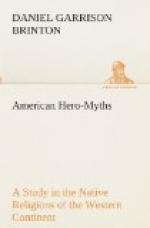Such an interpretation, if correct, would lead to the dismissal from history of the whole story of the Seven Cities or Caves, and the pretended migration from them. In fact, the repeated endeavors of the chroniclers to assign a location to these fabulous residences, have led to no result other than most admired disorder and confusion. It is as vain to seek their whereabouts, as it is that of the garden of Eden or the Isle of Avalon. They have not, and never had a place on this sublunary sphere, but belong in that ethereal world which the fancy creates and the imagination paints.
A more prosaic account than any of the above, is given by the historian, Alva Ixtlilxochitl, so prosaic that it is possible that it has some grains of actual fact in it.[1] He tells us that a King of Tollan, Tecpancaltzin, fell in love with the daughter of one of his subjects, a maiden by name Xochitl, the Rose. Her father was the first to collect honey from the maguey plant, and on pretence of buying this delicacy the king often sent for Xochitl. He accomplished her seduction, and hid her in a rose garden on a mountain, where she gave birth to an infant son, to the great anger of the father. Casting the horoscope of the infant, the court astrologer found all the signs that he should be the last King of Tollan, and should witness the destruction of the Toltec monarchy. He was named Meconetzin, the Son of the Maguey, and in due time became king, and the prediction was accomplished.[2]
[Footnote 1: Ixtlilxochitl, Relaciones Historicas, p. 330, in Kingsborough, Vol. ix.]
[Footnote 2: In the work of Ramirez de Fuen-leal (cap. viii), Tezcatlipoca is said to have been the discoverer of pulque, the intoxicating wine of the Maguey. In Meztitlan he was associated with the gods of this beverage and of drunkenness. Hence it is probable that the name Meconetzin applied to Quetzalcoatl in this myth meant to convey that he was the son of Tezcatlipoca.]
In several points, however, this seemingly historic narrative has a suspicious resemblance to a genuine myth preserved to us in a certain Aztec manuscript known as the Codex Telleriano-Remensis. This document tells how Quetzalcoatl, Tezcatlipoca and their brethren were at first gods, and dwelt as stars in the heavens. They passed their time in Paradise, in a Rose Garden, Xochitlycacan ("where the roses are lifted up"); but on a time they began plucking the roses from the great Rose tree in the centre of the garden, and Tonaca-tecutli, in his anger at their action, hurled them to the earth, where they lived as mortals.
The significance of this myth, as applied to the daily descent of sun and stars from the zenith to the horizon, is too obvious to need special comment; and the coincidences of the rose garden on the mountain (in the one instance the Hill of Heaven, in the other a supposed terrestrial elevation) from which Quetzalcoatl issues, and the anger of the parent, seem to indicate that the supposed historical relation of Ixtlilxochitl is but a myth dressed in historic garb.




